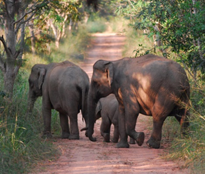

19th August 2023 (8 Topics)
Context
To prevent death of elephants due to train hits, the East Coast Railway (ECoR) has decided to install intrusion detection systems (IDS) at the sensitive locations of elephant passing zones and elephant corridors in Odisha.
Background
- According to official data, as many as 784 elephants died in Odisha during 2012-13 to 2021-22 due to various reasons while electrocution and train-hits are considered among the key reasons.
- Similarly, 925 persons were trampled to death by tuskers while 212 persons were permanently disabled during the period.

What is Intrusion detection system (IDS)?
- IDS is based on artificial intelligence (AI) and existing optical fibres will be used as sensors to identify movements of elephants at locations and alert control offices, station masters, gatemen and loco pilots.
- It uses the fibre optic based acoustic system to sense real time presence of elephants on the track.
- The AI-based system can monitor unusual movement up to a stretch of 60 km.
- The system will help in locating and detecting the presence of elephants near the track so that speed of the trains in the sections will be reduced.
- IDS will send alarms to the loco pilot unit via SMS/internet with GPS tag, providing real time information about the location of elephants.
- Significance:
- The detection system will work as an early warning system for elephant intrusion.
- IDS will also help in detecting rail fracture, trespassing on railway track and alert about disaster mitigation due to unauthorised digging near railway tracks, landslides near tracks.
Need of such an initiative:
- For Conservation of Elephants: Under Project Elephant, was launched in 1992 as a Centrally-sponsored scheme with an aim to protect elephants and improve its habitat and corridors, reduce human-elephant conflict and ensure their welfare.
- As many as 33 elephant reserves, spanning 80,777 sq. km, have been notified.
- To avoid Human-Animal Conflict: As prime elephant habitats are shrinking across Asia and human developments are on the rise, both species are increasingly coming into close contact.
- Human-elephant conflicts (HEC) arise with complex interactions between humans and elephants often resulting in detrimental impacts for both species.
Status of Elephants in India:
- India has about 27,000 Asian Elephants, which is the world’s largest population of the species.
- As per Elephant Census (2017), Karnataka has the highest number of elephants (6,049), followed by Assam (5,719) and Kerala (3,054)
- More than 60% of the world’s elephant population is in India.
- The elephant is the ‘Natural Heritage Animal of India’.
|
Asian Elephants:
|
Other Steps taken for Elephant conservation:
- Gaj Yatra(a nationwide awareness campaign to protect elephants): Monitoring the Illegal Killing of Elephants (MIKE) program (2003, to monitor the effectiveness of field conservation efforts)
- Gaj Soochna’mobile application for forest officials:
- Upholding the right of passage of elephantsby SC
- Involvement of mahouts and their familiesin the welfare of elephants
- Gaj Utsav: Asian Elephant Alliance, an umbrella initiative by five NGOs, had, last year, come together to secure 96 out of the 101 existing corridors used by elephants across 12 States in India.
More Articles


